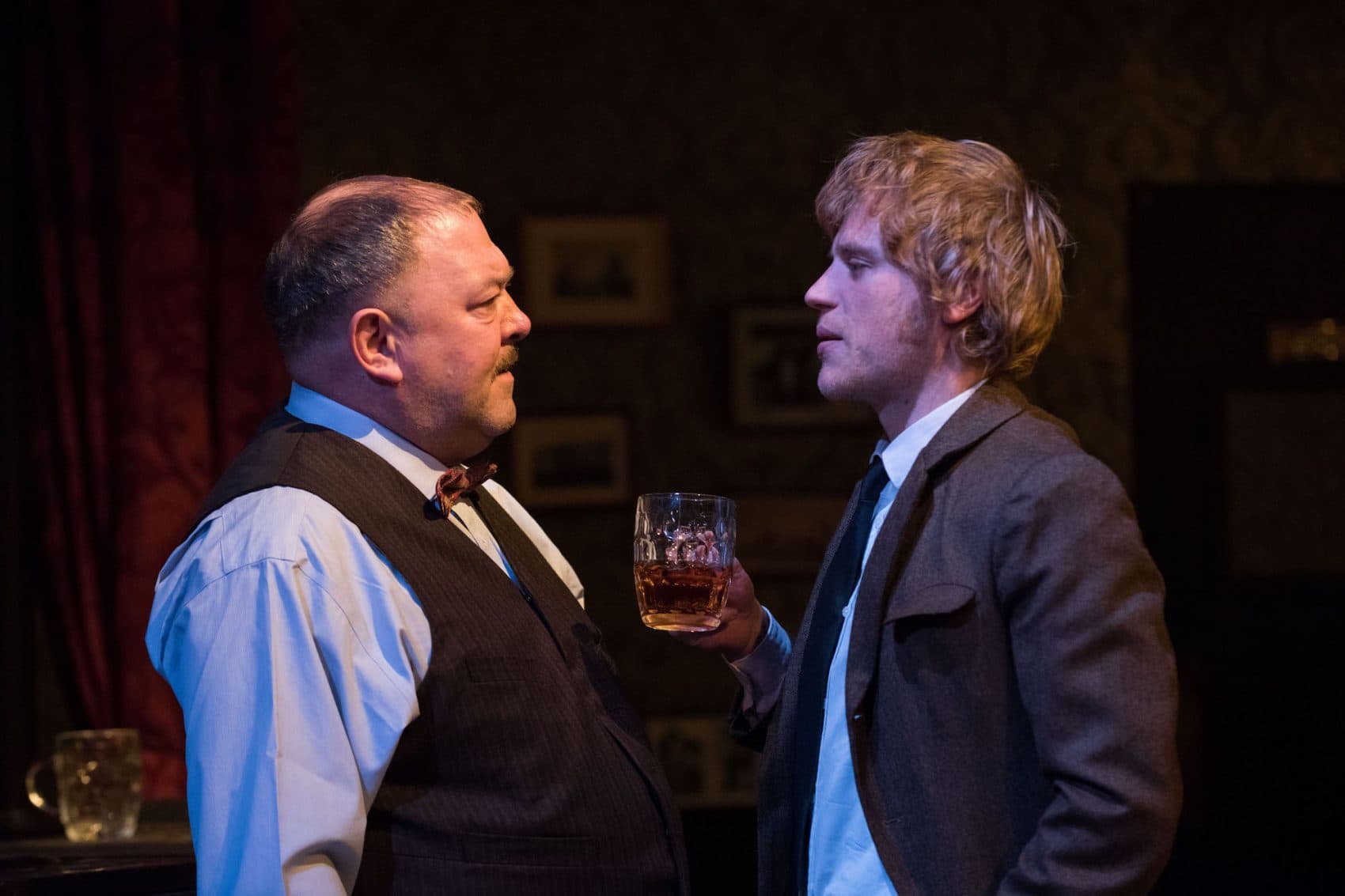Advertisement
Review
Martin McDonagh And Joshua Harmon's Plays Throw Political Correctness To The Winds In New York

Whether theater addresses issues that are timeless or issues that are strictly of the moment, there should be an expectation of engagement beyond what we get on TV or anywhere else, an expectation that the playwright has a grip on what to say, how to say it and how to keep us on the edge of our seats.
Martin McDonagh and Joshua Harmon come from different theatrical camps, but they both know how to grab us by the lapels and give us a good shake — and a good laugh. Even when very un-funny things are happening onstage in their current plays in New York:
Atlantic Theater Company's "Hangmen"
McDonagh’s “Hangmen” is having a brief run at the Atlantic Theater Company (through March 25) and odds are it will return on Broadway given the “Three Billboards” roll that he’s on, the rave reviews for this play and the utter quality of the work, both the play and the production.
The play opens in typical McDonagh style with a terrified James Hennessy awaiting execution in an English jail cell in 1963. The executioner is portly Harry Wade, stuffed comfortably into a suit and bowtie. He sees himself as a thorough professional, here to do his job and do it right. There’s a strong hint that Hennessy might be innocent, but that’s neither here nor there to our hail-fellow-well-met, or hail-fellow-well-hanged, Harry. And yes, Harry is here to tell you that the past tense of hang in this context is hanged not hung. Hennessy is not about to go gently, prompting Harry’s assistant to declare, “If you’d’ve just tried to relax you could’ve been dead by now.”
But this is mere prologue to the festivities, and there is a certain festive nature to McDonagh’s theatrical body counts. (Ironically, the cinematic deaths seem more realistic and tragic.) The real action of the piece takes place two years later, just as capital punishment has been banned in England. Harry is still a bow-tied professional, but now the proprietor of a pub in Manchester, England, pulling pints along with his wife and understandably recalcitrant daughter.
Ever reliving his glory days, Harry holds court as if “Hangmen” is a takeoff of “The Iceman Cometh.” He’s the alpha dog of this rather sorry lot of humanity until a bloke with an even more macabre sense humor than McDonagh walks in. Mooney is part Mick Jagger, part Malcolm McDowell in “A Clockwork Orange” — and all menace. Mark Haddy’s faux genial Harry and Johnny Flynn’s trés mysterious Mooney fighting for psychic supremacy are as good a theatrical pairing as you’re going to see onstage.
Is Mooney a devil or avenging angel — Hennessy threatened to haunt Harry. Or is he a McDonagh stand-in, an anarchic spirit meant to roil the psychic waters of folks who wear their complacency and, let’s say it, stupidity like a badge of honor. These days, with so many American playwrights trying to out-empathize each other, “Hangmen” blows in like fresh air. McDonagh isn’t here to make us feel better about ourselves or empathize with anyone else besides the daughter. And Matthew Dunster's dispassionate but sure-handed direction only adds to the mystery.
But, again like Mooney, what is McDonagh here to do? That’s the question as people try to come to terms with how good a writer McDonagh actually is. What is he saying in his plays? McDonagh often says he’s just telling stories without telling us what to make of them.
That, too, is fresh theatrical air. There’s always an issue afoot in his work — capital punishment, terrorism, racism, authoritarianism. And while we come away from these plays knowing that he’s against all those things, that’s not ever the main thing we come away with.
Whether it’s the hangmen at the end of this play or Frances McDormand and Sam Rockwell at the end of “Three Billboards,” there’s a sense that we’re on this absurd ride together, trying to come up with some game plan to make sense of the evil that men do. It may be a losing proposition, but with McDonagh’s characters, it’s always worth the ride.
Lincoln Center Theater's "Admissions"

Joshua Harmon is a different matter. His plays are easy to parse and if his issues are more transparent than McDonagh’s, he is every bit the provocateur. It’s obvious whom he was trying to provoke in “Bad Jews,” which was a hugely enjoyable look at assimilation vs. ethnocentrism.
The high-school student and his parents at the center of “Admissions,” at Lincoln Center through April 29, are Jewish-ish — they're a mixed, utterly secular household — though that isn’t of huge concern here. This play is more about race relations, with Jessica Hecht playing a white admissions officer at a prep school, whose president is her husband. Her goal is to redress the historic lack of representation at the school among people of color. She is just about to crack the 20 percent mark and the champagne is about to be uncorked. (It was 6 percent when she took over.)
Only their son, Charlie, is not so happy. He did not get into Yale, but his best friend, Perry, an African-American did. When we learn that Perry had lower grades than Charlie, you can almost guess where the play is going to go. But unlike Claudia Rankine’s dreary, hectoring play about race, “The White Card,” at Boston's Paramount Center, there’s nothing predictable about how it deals with issues like privilege and aggression, both micro and macro.
And, also unlike Rankine, Harmon gives everybody punchy lines, rather than reducing opposing viewpoints to tone-deaf, white-liberal stick figures. And make no mistake, the three Rosen-Masons are white liberals with PC pedigrees. Sherrie and Bill have even named their son Charlie Luther Mason in honor of Martin Luther King Jr. Bill could make anyone who doesn’t go all in on his version of academic liberalism seem like a racist.
Which is exactly how Bill feels about Charlie when his son carries on about being the victim of cosmic injustice because Yale was playing the same numbers game with admissions that his mother does. That there’s something insufferably smug about Bill’s manner doesn’t mean that he isn’t right. He makes a smart case for his positions, as you would expect from the liberal president of a prep school.
While Hecht and Andrew Garman play the parents as totally composed and sure of themselves, Ben Edelman is purposefully over the top as Charlie. It’s such an overwrought, caffeinated performance that it’s obvious what director Daniel Aukin is shooting for. And Edelman makes it all worthwhile during a wild 15-minute-plus aria about diversity. His Charlie is hilarious when talking about how the children of Nazis who fled to Argentina after wiping out his grandparents’ generation are now people of color and get preferential treatment over Jews when applying to college.
Whether you end up agreeing with him, his parents, or his best friend’s mother (who’s also white), audiences are bound to come away thinking that issues around diversity aren’t, er, black and white. And that the path forward should not be strewn with eggshells.

